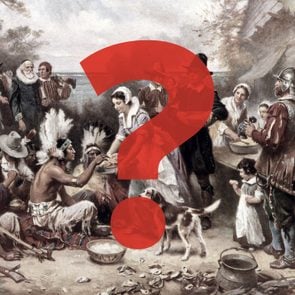Why Is Black Friday Called Black Friday?
Updated: Nov. 26, 2023

The term has been around since the 1800s, but it hasn't always been about low prices and holiday shopping. Here's the surprising origin of modern Black Friday.
It may not be an official holiday, but Black Friday is about as American as, well, Thanksgiving. With bellies still stuffed with turkey, we rise at the crack of dawn for massive sales that usher in the holiday shopping season. If you like saving money, you’ve probably even scored a few Black Friday deals yourself. But while standing in those endless lines to get your hands on some cheap Christmas gifts, have you ever asked yourself, Why is Black Friday called Black Friday?
You might be surprised to learn that the tradition we’ve tied to Thanksgiving is a far cry from the original Black Friday, which took place in 1869 and had nothing to do with the holidays or shopping. Before you brave the crowds for the unofficial shopping holiday, learn a little about Black Friday’s origin and how it got its name.
Get Reader’s Digest’s Read Up newsletter for more holiday history, humor, cleaning, travel, tech and fun facts all week long.
When is Black Friday?
Black Friday occurs the day after Thanksgiving. Since Thanksgiving is held on the fourth Thursday in November, that means Black Friday is the fourth Friday in November. But the sales don’t end there. Black Friday is immediately followed by Cyber Monday, during which shoppers can stay in their pajamas while taking advantage of online deals.
When does Black Friday start?
Traditionally, Black Friday was the day after Thanksgiving. But the shopping holiday has undergone some major changes over the years.
For starters, some retail stores began opening on Thanksgiving to lure shoppers in a day early. Thankfully, that trend didn’t last long, and many big-box stores, such as Walmart, Target and Home Depot, now stay closed on Thanksgiving Day. Instead, Black Friday has morphed into a week, a month or, in the case of stores like Target, a season of deals.
Of course, that doesn’t explain the biggest mystery: Why is Black Friday called Black Friday? For that, you need a little history lesson, so read on.
When was the term Black Friday first used?
The first Black Friday actually had nothing to do with Thanksgiving or holiday shopping. It was the day the U.S. gold market crashed.
Financiers Jay Gould and Jim Fisk wanted to hoodwink Wall Street investors. They bought as much gold as they could, driving up gold prices by more than $30 an ounce. On Friday, Sept. 24, 1869, the government put millions of dollars worth of gold onto the market. The price plummeted, investors went bankrupt instantly and Gould and Fisk came out on top.
What’s the origin of Black Friday?
The origin of Black Friday as we know it today starts in Philadelphia during the 1950s and ’60s. Crowds of people would come to town the day after Thanksgiving for the annual Army-Navy football game held the following Saturday. Streets and stores were always packed, which was great for business but made easy pickings for shoplifters.
Local police called this Black Friday—and for good reason. Not only did they have to deal with extra traffic and shoplifting, but they also had to work extra hours and couldn’t request the day off.
Why is Black Friday called Black Friday?
The first use of the term Black Friday was tied to a financial crash, much like the 1929 stock market crash was known as Black Tuesday. The second is an unflattering nickname for a day rife with traffic and shoplifting. So why do they call it Black Friday when referring to day-after-Thanksgiving sales?
When the term spread across the nation in the late 1980s, the definition changed. While retailers generally suffered financial losses most of the year, the surge of holiday shoppers marked the first day of real profit. In traditional accounting practices, losses were recorded in red ink, and profits in black ink. And that’s why the day after Thanksgiving, when companies go “into the black” and make a profit, became Black Friday.
So when a relative asks over a plate of turkey and green beans, “Why is Black Friday called Black Friday?” you’ll know the full answer. Though if you really want to wow ’em, brush up on the history behind the Thanksgiving turkey.
Sources:
- PBS: “Black Friday, September 24, 1869”
- The Philadelphia Inquirer: “Philly’s role in the naming of ‘Black Friday’ started with Center City traffic”



